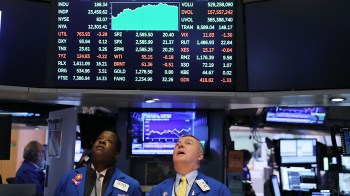In 1989, the year Marketplace first went on the air, the average cost for a year of a private, four-year college was $11,474 for tuition, room and board. If those costs had risen only with inflation, the average price would be $22,045 these days. According to the College Board, the actual cost for the 2013–2014 academic year was $40,917. We plan to dig deeper into the cost of higher ed later this fall in our inflation series.
I am currently paying for two college tuitions, so I find the subject too grim to discuss right now. And when I am feeling down, there’s nothing like something on a bagel to cheer me up. Something like smoked salmon.
We are conditioned to assume that everything gets more expensive over time. However, that is not necessarily the case, which is why silky, red-orange fish comes to mind. When I was a kid, my family treated smoked salmon like it was caviar. Somebody would bring back from the deli just an eighth of a pound, which we would carefully apportion as morsels on the bagel like scraps of gold leaf. The cream cheese completely overwhelmed the salmon. These days the cream cheese has lost the battle. There is a place near me where you can get a fresh, toasted bagel with a good three-quarters-of-an-inch slab of smoked salmon for $6.50.
What has changed? In part, aquaculture. A fisheries economist tells me that more than half of the fish the world eats now is, essentially, farmed. In the last 25 years, countries from Scotland to Chile have taken to large-scale-farming the salmon that become smoked salmon. Fish farming can have an environmental cost, and done poorly the practice is unsustainable and can hurt the wild salmon fishery. Yet there is no doubt the practice has altered the wholesale and retail markets. For a time, prices dropped and smoked-salmon sandwiches got a lot thicker.
But the story of smoked salmon does not end there. There is salmon production and there is salmon consumption. Around the world people have developed a taste for the stuff, nowhere more so than in China with its burgeoning middle-class. All this demand could have put smoked salmon back into caviar class.
One man who knows is Saul Zabar, president of New York City’s legendary grocery Zabar’s. Saul figures he sells about 2,000 pounds of smoked salmon a week. That’s, literally, a ton. He sees the gradual shift from wild salmon to farmed helping to keep prices under control.
“The fact that we have farmed salmon has kept the product at a reasonable level so that it’s available to the people who are not wealthy,” said Zabar. “It’s kept it as a middle-class product, which is great. It’s enabled us to sell product to a wide variety of people, where if it had remained wild, it would be only available to people who have the means to buy it.”
Zabar couldn’t remember what he was charging for smoked salmon 25 years ago. However, I did find a New York Magazine from that year that mentioned a Zabar’s sale price: $15.95 a pound, Scotch salmon, pre-sliced. That’s like $30.65 today. And what is Saul actually charging today, routinely, no special sale? $23.95 a pound. In real terms, that’s a 22 percent decline in 25 years.
Also interesting is why the price hasn’t come down further at Zabar’s. Saul told us his prices have to reflect not just the wholesale price of the salmon, but his other costs. He owns his famous building, so that’s not the problem. He does single out what he has to pay for health care for his employees. Now that’s a whole other kettle of fish where deflation has certainly not been the trend.
There’s a lot happening in the world. Through it all, Marketplace is here for you.
You rely on Marketplace to break down the world’s events and tell you how it affects you in a fact-based, approachable way. We rely on your financial support to keep making that possible.
Your donation today powers the independent journalism that you rely on. For just $5/month, you can help sustain Marketplace so we can keep reporting on the things that matter to you.


















